São Paulo – The Arab immigrants that live in Brazil and their descendant marked the life stories of many Brazilians. A series of personal and professional testimonies on this influence were presented on Thursday, March 25, the Arab Community Day in Brazil, during an online event hosted by the Arab Brazilian Chamber of Commerce (ABCC) and the Arab House.
Few people know it, but Brazil’s best basketball player Oscar Schmidt (pictured above) used to play for the Syrian Sports Club, which was founded by the Syrian community in São Paulo. At the club, he won the world title and gained national and international recognition. In a recorded video Schmidt talked about that and how the Syrian Sports Club was the best team he played for. “Some of my greatest friends came from there,” he said. “I really miss those times,” he finished.
As for musician Cláudio Kairouz, he’s often mistaken for an Arab descendant. But he says his connection is different. “I’m a proud Brazilian, but my heart is Lebanese,” he said in his live participation in the webinar. Coming from a classical piano background, he came across the Arab music in his teenage years and has never left it since. He moved to Lebanon and is now known as one of Brazil’s greatest Arab music performers.

Writing the Orientalíssimo blog for the Folha de São Paulo newspaper is another Brazilian who’s embraced the Arab culture despite not having blood ties to the region. Diogo Bercito writes on Middle East-related topics in his blog. Besides having being a correspondent for Folha in Jerusalem, having lived in Beirut and Cairo, he got a doctor degree in the History of Arabs in Brazil. “I’m not an Arab descendant, but I’m pleased to tell some of their history, to be somewhat part of it,” he said.
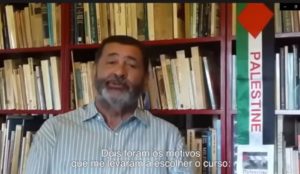
Scholar João Baptista Vargens de Medeiros won the UNESCO-Sharjah Prize for Arab Culture promoted by the the United Nations’ cultural agency and the government of Sharjah, United Arab Emirates. But his connection with the Arabs had started long before, when he studied Arabic at the Federal University of Rio de Janeiro (UFRJ) and then moved to Syria to study Arabic and Morocco to teach Portuguese and Brazilian culture. He said he had two reasons for studying Arabic: the influence of stories set in the Arab countries and his identification with the Palestinian cause.
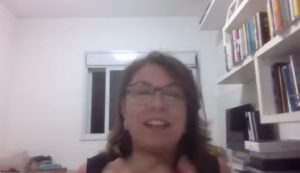
Another person who told their story with the Arabs was H2R Pesquisas Avançadas institute director Alessandra Frisso. Married to a Syrian-descendant husband, she talked about how welcome she felt in her husband’s family and the Arab community in Brazil, and how she felt at home when visiting Arab countries such as Egypt and Tunisia. “This changed how I now see family and the Arab community,” she said. Frisso became the president of the ABCC’s women’s committee WAHI – Women Who Inspire, which works to bring Arab and Brazilian women together, particularly in business.
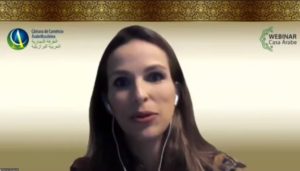
ABCC Marketing manager Karina Cassapula gave her testimony as an enthusiast of the Arab culture. A non-Arab descendant, Cassapula talked how she came across the culture when she was first hired by the ABCC in 2008 – and again in 2019 – and started touring through the Arab nations such as the ancient Egypt and the modern UAE. “When we really like something, we get passionate about it, and it shows,” she said.
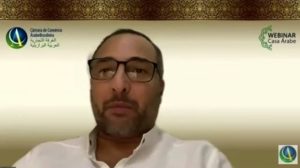
The testimonies from people who had their life stories marked by Arabs, immigrants or the Middle Eastern culture were moderated by ABCC secretary-general Tamer Mansour, who’s an Egyptian immigrant who moved to Brazil in his youth. “When we planned this part of the event, we wanted to understand how far the Arab influence had reached in Brazil,” he said. The idea was showing that the Arab presence in Brazil goes far beyond its immigrants.
Arabs across Brazil
But the event on Arab immigration also brought stories by those who are part of the community as descendants and have a relevant role in the Brazilian development in their particular area of expertise. A testimony by Brazil’s former president Michel Temer, a son of Lebanese parents, was broadcasted. He described his life story as an example of how Brazil can be welcoming for immigrants. Grupo Bandeirantes TV host Renata Maron also addressed how proud she’s to be part of the community and how her world has changed since she first traveled to an Arab country.

The event’s host, journalist Marina Sarruf, gave her own testimony. She’s the ABCC communication coordinator but was one of the first reporters of the Brazil-Arab News Agency (ANBA) and did media coverage in several Arab countries, including Iraq. I’m so proud to have worked at ANBA for seven years,” she said. Dr. Alvaro Sarkis, a Urology professor at the University of São Paulo (USP), talked on video about his Arab background and mentioned the colony’s contribution for the creation of institutions that bring wellbeing for the Brazilian peoples, such as the children-oriented Lar Sírio and Mão Branca, for the elderly, as well as HCor and Sírio-Libanês hospitals.
March 25
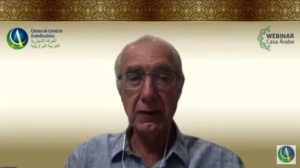
The event was opened with a brief history on the Arab immigration to Brazil and the size of the Arab community in Brazil, which reaches 11.6 million people. A survey commissioned by the ABCC and carried out by Ibope Inteligência and H2R Pesquisas Avançadas research firm found out this figure, first made public last year. In a brief video, Ibope Inteligência CEO Márcia Cavallari addressed the survey’s making.
ABCC president Rubens Hannun explained how the Arab Community Day in Brazil had to be celebrated online for the second year running due to the pandemic. “We’re minding the social distancing,” he said. Even so, the event got viewed by some 3,600 people. Hannun said the webinar was for all – Arabs, descendants and others who live with this community in Brazil.
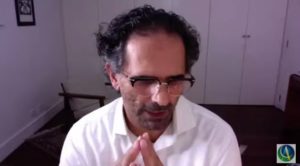
An expert in studies on the Middle East, Arab World and Muslims, Salem Nasser talked about the Arab Community Day, which is celebrated on March 25 in honor of the 25 de Março Street in São Paulo, where many Arab merchants lived after moving to Brazil. He said that, before the Arabs settled, it was a key commercial street in the city of São Paulo. “At some point, the Arabs took over the street,” said Nasser. The Arab Community Day was created based on a bill by senator Romeu Tuma.
Solidarity
During the event, the immigration was also addressed from other perspectives such as the solidarity that has brought together Arabs and Brazilians in these COVID-19 pandemic times. The ABCC, which called on the community to help hospitals and institutions with protective equipment during the pandemic and did the same to send relief to Lebanon last year, has launched a new campaign to raise food baskets and distribute them to struggling Brazilians. Find out more in another story.
Memory

The viewers were also called to collaborate with the Digitization Project of the Memory of Arab Immigration in Brazil. The initiative is carried out by the ABCC in partnership with the Holy Spirit University of Kaslik (USEK) in Lebanon to document and digitize the history of this immigration to Brazil. The project’s coordinator Heloisa Abreu Dib Julien talked about the work progress and asked people to submit any materials they have. For more information, please send an email to projetousek@ccab.org.br.
The online event on the Arab Community Day in Brazil was supported by broadcaster TV Cultura and Grupo Bandeirantes de Comunicação, which was greatly appreciated by the ABCC.
Find out more:
Arab Brazilian Chamber launches new solidarity campaign
Watch the full webinar on YouTube:
Translated by Guilherme Miranda





